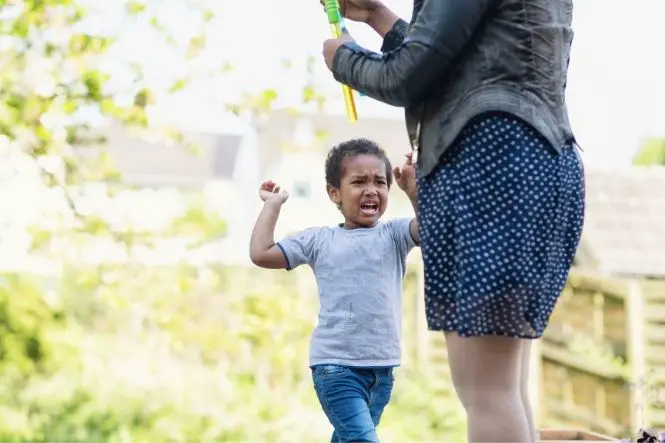Children may begin to pinch others around their first birthdays and continue on through the “terrible twos” until the behaviour naturally dies out around their third birthdays. Though adults interpret pinching as a form of aggression many young children do not make this connection when they first begin to pinch. For most parents, discovering the reason behind a child’s pinching will help them understand why the behaviour has begun, and immediate and effective discipline will help it end.
Discover the Cause of Pinching
Children may begin to pinch for a variety of reasons. Young children may be just learning small muscle control and therefore use pinching as an interesting means of grasping items or exploring their own abilities. They may also simply be interested in what others feel like and have decided to investigate through pinching. Older children may be imitating a new friend who pinches, and still others may have pent-up aggression that they are unable to verbalise so instead they show their emotions through actions such as pinching. Some children may even pinch because they realise that it brings them a reaction and therefore attention on demand.
Discipline Pinchers Immediately
Even if children pinch as a means of getting attention, they won’t appreciate the negative attention that interrupts their activities and requires them to be disciplined. Parents who are living with a pincher should discipline their child immediately for this behaviour by giving him/her a clear warning and stating “No pinching!” when the behaviour does occur. Children who do not heed this warning should be removed from their activities immediately to sit on the Naughty Step or in Time Out. These options allow the child time to reflect on their pinching. Before being allowed back to their activities children should apologise to those who were pinched and be able to explain why pinching is wrong.
Even if a child pinches others frequently (s)he should be disciplined each time the behaviour occurs. Saving discipline to encompass a number of indiscretions – or for later, if the child is out in public – risks the child forgetting why (s)he is being disciplined and the message that pinching is inappropriate. Pinchers should not be disciplined by being pinched themselves. Not only does this rarely teach a child not to pinch but it usually reinforces the behaviour as children think that if others do it then it must be ok!
Apply the Golden Rule
When children pinch others they may not realise that they are causing physical pain in addition to hurt feelings. Parents should explain this to children in simple language, for example by saying “It hurts people when you pinch them”. Parents should also take these opportunities to explain the Golden Rule to children – that they should treat others the way that they would like to be treated. When it is repeated often enough children will learn from this rule and be able to judge for themselves which behaviours are appropriate and which are not.
Children pinch others for a variety of reasons. Parents of pinchers should discipline their child immediately when they pinch and use the opportunities to remind the child of the Golden Rule. Most children grow out of pinching on their own, but parents who are concerned about this behaviour should talk to their GP.



